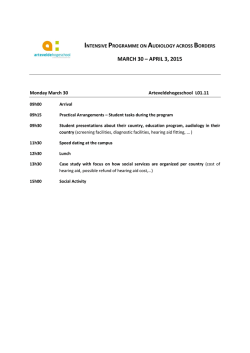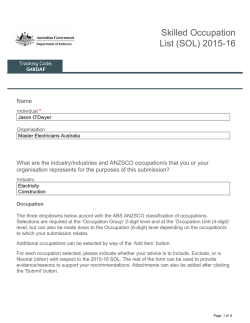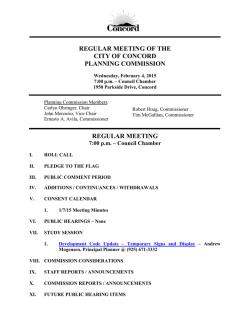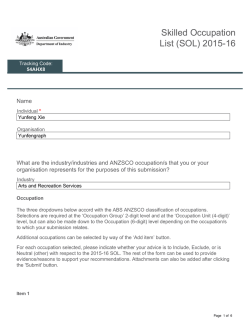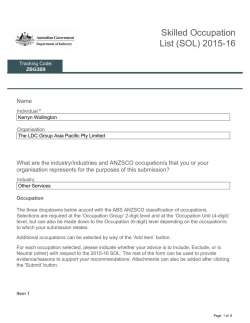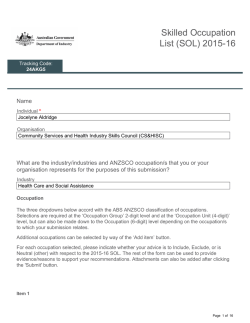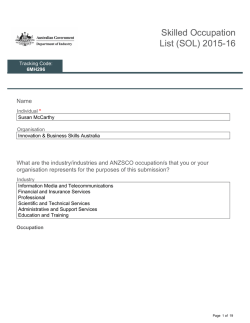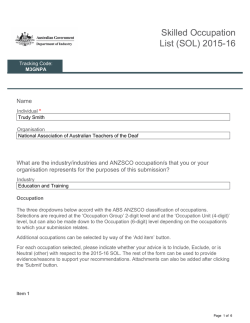
Skilled Occupation List (SOL) 2015-16
Skilled Occupation List (SOL) 2015-16 Tracking Code: QZ2MC9 Name Individual * Dr Louise Collingridge Organisation Independent Audiologists Australia Inc (formerly the Australian Association of Audiologists in Priva What are the industry/industries and ANZSCO occupation/s that you or your organisation represents for the purposes of this submission? Industry Health Care and Social Assistance Occupation The three dropdowns below accord with the ABS ANZSCO classification of occupations. Selections are required at the ‘Occupation Group’ 2-digit level and at the ‘Occupation Unit (4-digit)’ level, but can also be made down to the Occupation (6-digit) level depending on the occupation/s to which your submission relates. Additional occupations can be selected by way of the ‘Add item’ button. For each occupation selected, please indicate whether your advice is to Include, Exclude, or is Neutral (other) with respect to the 2015-16 SOL. The rest of the form can be used to provide evidence/reasons to support your recommendations. Attachments can also be added after clicking the 'Submit' button. Item 1 Page 1 of 5 Occupation Group * Health Professionals Occupation Unit * Speech Professionals and Audiologists Occupation Audiologist 252711 Summary advice for 2015-16 SOL * Include Exclude Neutral Are there any occupations that you represent where there is evidence of imbalances in the demand for and supply of skills in the medium-to-long term? * Universities in Australia offer postgraduate training in Audiology. Over the past five years, many of the universities have increased the number of students that each accepts onto their audiology programme. The number of graduates from Australian universities has noticeably increased. However, the profession does experience a high rate of attrition, and so the increased number of graduates may not be sufficient to meet the demand. Further, within the profession, a need for experienced audiologists with specialist skills in rehabilitation, advanced diagnostic services, balance disorders, and specialist applications is well recognised. Audiology is currently under represented in specialist healthcare areas of gerontology, psychiatry and neurology, in both research and clinical services. The training structure within Australian universities is designed to produce high numbers of graduates who have generalist skills. With little opportunity to specialise within the field, an imbalance exists in that audiologists with little experience are available, but there continues to be a demand for experienced, specialist audiology services. Is there evidence of imbalances in the demand for and supply of skills in the medium-to-long term in non-metropolitan areas? If so, can you indicate in what part of Australia and the number in the occupation in over or undersupply. Many clinics offer services on a visiting basis only - visiting a community monthly, or even less Page 2 of 5 frequently. Whilst superficially, this may appear to indicate that services are available in regional areas, visiting professionals who are not part of a local community are not able to offer day to day support. There is very clearly a need for audiology to integrate with other members of the healthcare team to offer comprehensive and effective services and permanent (as opposed to visiting) clinical services are best placed to achieve this. As an example, audiologists, whose scope of practice includes hearing and balance disorders could work well in a multidisciplinary team to reduce the risk of falls in the elderly through assessment and referral, thus preventing one of the most life changing events (falls) that many elderly people experience. Yet, visiting sites typically only address the hearing device needs of patients due to limited time in each site. A very clear need is for regional areas to develop permanent audiology services. Are there any occupations which require formal licensing or registration arrangements in order to practice/perform in this occupation? For example: • Midwives are required to register with the nurses board in their state or territory • Panelbeaters are required to be registered or certified with the state Motor Vehicle Repair Industry Authority Audiology in Australia, although a health care profession, is an unregistered profession that currently, does not fall under the Australian Health Professions Regulatory Authority (AHPRA). Any person, no matter how qualified, can establish an Audiology practice in Australia and offer services to the public if they do not seek any public funding, leading to the current situation of some audiology businesses in Australia being owned and managed by those without any clinical training or background who are not eligible to join a professional association of audiologists. Presently, only audiologists who are funded through the Hearing Services Programme, Department of Veterans Affairs, Medicare and/or Better Start are required to belong to a recognised professional association if they deliver clinical services. Providers are those who hold contracts to deliver services under the Hearing Services Programme. Providers are not required to belong to a professional association or have any audiology qualifications. We believe that all those working in the field of audiology (regardless of country of origin or where they were educated) ought to be registered professionals with tertiary qualifications in audiology. Is it expected that your employment sector will be impacted by any medium-to-long term trends which will impact upon demand and/or supply (excluding costs associated with training, labour hire, and international sponsorship)? Please provide evidence (e.g. data source, policy document) which substantiates these claims. Page 3 of 5 For example: • New benchmarks for childcare centres mandate increased staff-to-child ratios and higher qualification standards for childcare workers. Australian Hearing is a government agency that is currently being scoped for sale. Australian Hearing has, to date, been the only provider to receive public funding to deliver hearing services to the population less than 26 years of age, and to pensioners and veterans deemed to have complex communication needs. They also compete with the private sector for pensioners funded via a voucher scheme. The impact of any potential sale of Australian Hearing on the need for audiologists in Australia is very uncertain. If Australian Hearing was to be sold, the need for specialist audiology services within the privately funded sector (both independent and multinational chains of clinics) could increase significantly. Some businesses that rely on audiometrists trained at TAFE with a limited scope may find that in order to meet clinical needs, that more audiologists with the skills to work across all ages and types of communication disorders are required. Should this occur, it is predictable that the demand for audiologists could increase beyond the supply of new graduates from Australian universities. Please provide any other information you consider relevant evidence to support your submission For example, you may know of some independent studies about your occupation that supports your advice to us. An in-depth investigation of communication needs of those with hearing loss in Australia (across all sectors) is not available. The need for services is often masked by the incorrect assumption that hearing devices are available and can solve communication difficulties provided they are supplied to individuals. In reality, the complexity of communication difficulties requires both hearing device supply and audiological services. To date the device focus has masked the need for audiologists who are the professionals who are able to assist those with communication difficulties that are not remedied with hearing device fitting alone. We believe that Audiology should be placed on the SOL to ensure sufficient services available in the medium to long term. Would you like to make any additional comments on the SOL? Population trends towards and ageing population and the complexity of needs in vulnerable populations such as the elderly or those with learning difficulties are placing increasing demands on the field of audiology to address complex communication difficulties that are associated with hearing loss. Those populations are not best catered for with the fitting of a hearing device, such Page 4 of 5 as is currently accessible to most Australians. Addressing the complexity of communication difficulties associated with hearing loss requires knowledge of language, communication, memory, executive functioning, psychosocial functioning – and the audiology field is the healthcare profession that addresses these issues. Although universities are producing more graduates in the field, the demand for specialist services has not diminished and we do not forsee any reduction in the need for experienced audiologists with specialist skills in the medium to long term. Please provide the name, position and contact details of a person within your organisation who is willing to be contacted if any further information or follow-up is required. Name * Dr Louise Collingridge / Ms Elaine Melville Position * Executive Officer, Independent Audiologists Australia / Chair of Advocacy, Independent Audiologis Contact details * [email protected] P.O. Box 164 Turramurra NSW 2074 All information, including name and address details, contained in submissions will be made available to the public on the Department of Industry website unless you indicate that you would like all or part of your submission to remain in confidence. Automatically generated confidentiality statements in emails do not suffice for this purpose. Respondents who would like all or part of their submission to remain in confidence should provide this information in an email to SOL@industry. gov.au . Legal requirements, such as those imposed by the Freedom of Information Act 1982, may affect the confidentiality of your submission. Page 5 of 5
© Copyright 2026
